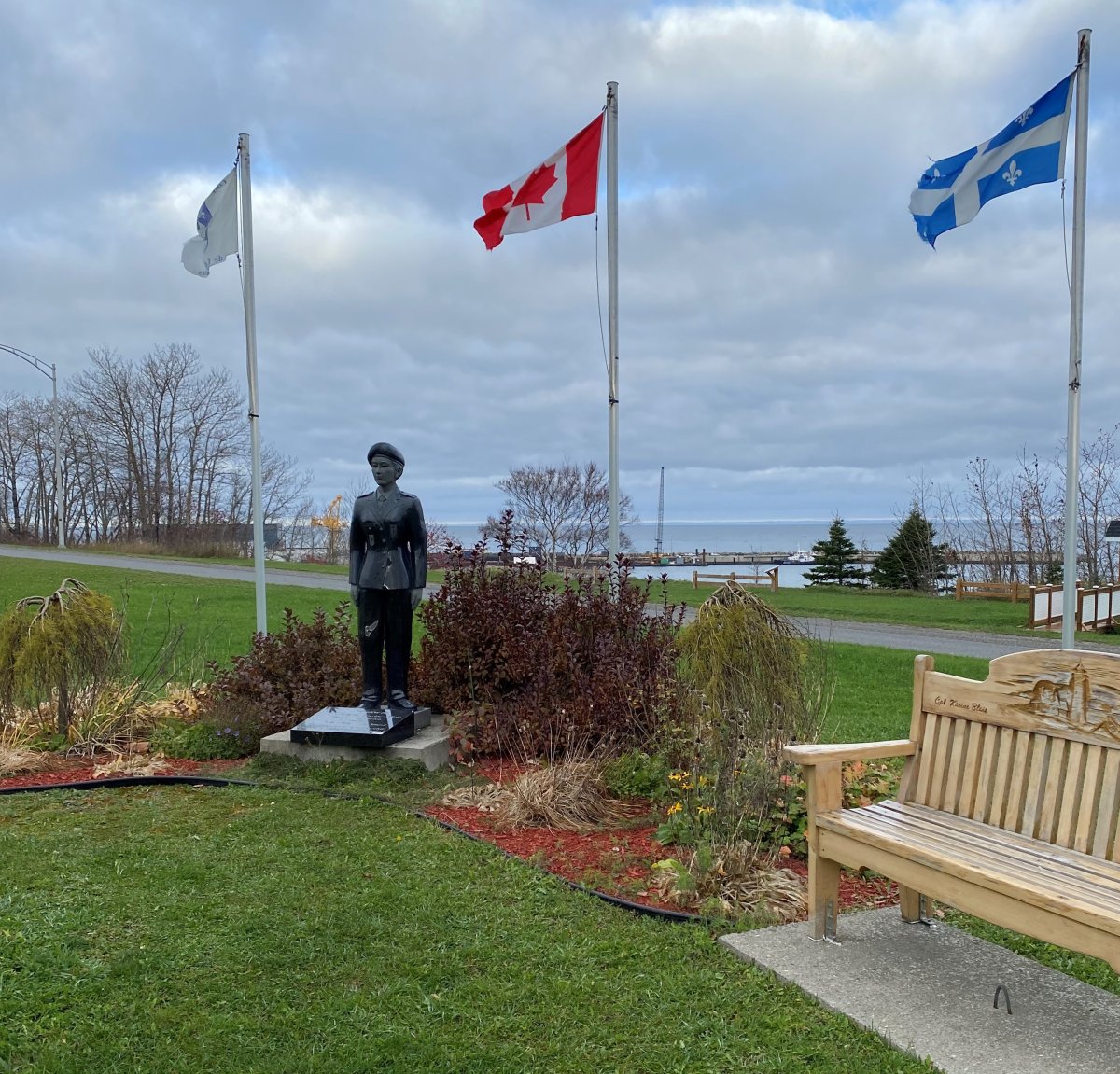Drive through the small village of Les Méchins, Que., and there’s a monument you’re not likely to miss.

Right on the main road, at the base of a Canadian flag, lit up at night, there’s a statue of a young woman.
The people here knew her. It’s that kind of place. It’s small enough that when Karine Blais was killed in Afghanistan, it was a loss for all of Les Méchins.
“It was as though the war felt very close,” says Josée Simard, Karine’s mother. “Someone from the village had left on a mission, and didn’t come back.“
Simard has been selected by the Canadian Legion as this year’s National Silver Cross Mother. On Remembrance Day, and for the next year, she will represent all mothers who lost sons or daughters in military service to the country.
Blais was killed April 13, 2009, on patrol north of Kandahar. She was driving a Coyote armoured vehicle when it hit an improvised explosive device. The vehicle was flipped, Blais was killed and two other soldiers were injured.

Simard says she’s been asked to be the Silver Cross Mother before but has always declined. The family’s normal tradition is to get together at their home with men and women who were with her daughter in Afghanistan. Some have left the military, others are still serving, but they like to be together on Nov. 11 and to remember Karine. Simard will be in Ottawa for this year’s Remembrance Day, but she says the friends are still getting together at her home.
“Everyone adored her,” Simard says.
Karine Blais was born Jan. 4, 1988, in Cowansville, Que. She was just a few years old when she moved with her mother and brother to Les Méchins, about 400 kilometers north-east of Quebec City on the south shore of the St-Lawrence River in Quebec’s Gaspé region.
As a child, Blais grew up dreaming of joining the military. In 2006, she made the jump from the cadets to the 12th Armoured Regiment of Canada, based at CFB Valcartier in Quebec. In Afghanistan, she was serving with the 2nd Battalion, Royal 22nd Regiment Battle Group.
Before she left for Afghanistan, friends and family had a party as a send-off. Barely three weeks later, a military chaplain and a few soldiers pulled up in front of Simard’s home.
“It was about four in the afternoon,” Simard says. “I thought they were raising money for the cadets.”
Instead, it was to inform the family that Blais had been killed. The next days and weeks are a blur, Simard says. The family travelled to Trenton for Blais’ repatriation ceremony. Her funeral was held at the local church in Les Méchins, across the street from the elementary school she had attended.
Blais’ brother was just 14 when she was killed, and took it hard. Simard says he talked about following his sister into a career in the military.
“He wanted to join the army, but I couldn’t allow it, ” she says. “I couldn’t even hear him talk about it.”
After her death, Blais’ personal effects were packed up and sent to Simard. In the 12 years since, she says she still hasn’t been able to look at them. They’re in a box in the basement, unopened.
Simard also doesn’t look at old photo albums. She says it’s too painful. That said, there are photographs and memories of her daughter all around the home.
There’s a smiling photo from high school in the living room, and another, more serious, from the regiment.
Hanging on the wall in the kitchen is the framed photograph of Karine given to Simard by Governor-General Michaëlle Jean at the repatriation ceremony in Trenton.
When Karine was killed, strangers sent cards and letters, and wrote songs. One artist gave the family a bronze relief sculpture of Karine’s face. What likely took dozens of hours of work, arrived just days after her death.
“When she died, all of Canada went into mourning,” Simard says. “I felt it.”
In 2011, Simard travelled to Afghanistan on a next of kin visit with the Canadian Armed Forces. She was at the Kandahar Air Field for the Remembrance Day ceremony on Nov. 11, and laid a wreath at the cenotaph.
Simard says she was struck by the extreme poverty she witnessed.
“I wanted to breathe the same air where Karine took her last breath,” Simard says. “Because I never saw her again. I never saw her body.”
The last few month have been difficult for Simard and her family as they’ve watched the Taliban retake control of Afghanistan following the U.S. pullout.
Simard says she focuses on what was accomplished. A generation of women went to school and tasted freedom they never would have known. Recent protests of Afghan women taking to the streets, she says, are proof something was accomplished.
“The difference is there,” Simard says. “Karine didn’t die for nothing.”










Comments